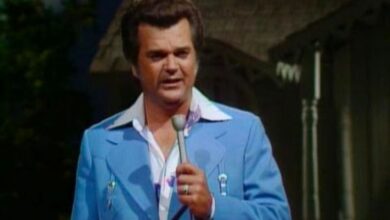Exploring Loretta Lynn’s Powerful Message in ‘Don’t Come Home A’ Drinkin (With Lovin’ on Your Mind)’
Loretta Lynn’s “Don’t Come Home A’ Drinkin’ (With Lovin’ on Your Mind)” is a timeless classic that solidified her position as a leading voice in country music. Released in 1967, the song not only topped the Billboard Country Charts but also became an anthem for women around the world. More than just a country music record, this tune marked a significant cultural shift and continues to be relevant over half a century after its release.
From the very first note, “Don’t Come Home A’ Drinkin’ (With Lovin’ on Your Mind)” delivers a powerful and defiant message. It tells the story of a woman standing up to her husband, asserting her boundaries, and refusing to put up with his bad drinking habits. As he stumbles home drunk and amorous, she firmly tells him not to come home with “lovin’ on his mind”. This was a daring message for the time, as traditional roles were being questioned and many women were starting to take a stand against domestic issues.
The song’s success is not only due to its captivating narrative but also due to Loretta Lynn’s unique voice. Her raw and honest vocal delivery resonates with listeners, making the song’s message even more potent. Lynn’s voice is a blend of strength and vulnerability, embodying the character’s pain, frustration, and determination. This authenticity is one of the reasons why Lynn has been so influential in the country music scene.
“Don’t Come Home A’ Drinkin’ (With Lovin’ on Your Mind)” is also notable for its contribution to Lynn’s career. The song became her first number one hit on the Billboard’s Hot Country Singles chart, marking a turning point in her career. Its success helped establish Lynn as a significant figure in country music, paving the way for her to become one of the genre’s most beloved artists.
Loretta Lynn co-wrote this song with her sister Peggy Sue, demonstrating her songwriting prowess. The song portrays the harsh realities of living with an alcoholic partner, a subject matter rarely broached in songs during that time. It’s a testament to Lynn’s courage and creativity that she chose to write about such a topical issue.
In conclusion, “Don’t Come Home A’ Drinkin’ (With Lovin’ on Your Mind)” is more than just a country music hit. It is a powerful statement of a woman’s right to respect and dignity in a relationship. Loretta Lynn’s boldness in addressing societal issues through her music has made her a role model for many. This song, with its strong message and unforgettable melody, rightly holds a firm place in the annals of country music.





